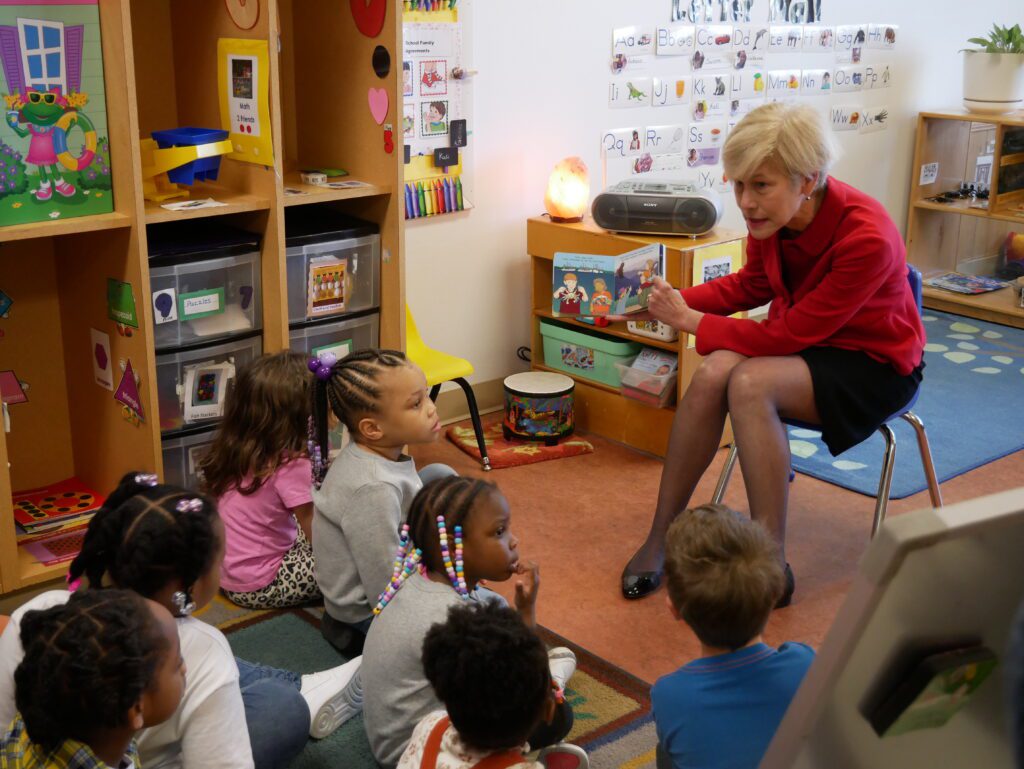Spring is springing
Early Bird readers, hello again. Newcomers, welcome! If you were forwarded this email, you can sign up here to receive it every two weeks, and join our conversation on issues facing North Carolina’s young children and those who support them. If you’re already a subscriber, please help us reach more people by sharing this with your friends and co-workers interested in early childhood education.

Spring officially has sprung here in the Piedmont, and Liz and I are busy little bees! We’ve been catching up on all the news we missed while we were on spring break at the end of March, including the addition of $1 billion for Child Care and Development Block Grants at the federal level, and the release of the Child Care Resource & Referral (CCR&R) Council’s newest provider survey results in North Carolina.
While we were on our break, we each spent quality time with important young learners in our own lives — Liz with her precious 3-year-old nephew and me with my lifelong friend’s charming 4-month-old daughter. I know I speak for both of us when I say what a good reminder that time was of how hard parenting can be without loads of support, and how necessary it is for families to have access to high-quality, affordable child care.
And just this week Liz was in Forsyth County visiting a family child care home and a new child care program at Forsyth Tech (stay tuned for more about both in the coming weeks). While she was on the road, I sat in on a legislative oversight committee meeting, and then she came back and attended a Wake County child care event coordinated by the office of U.S. Rep. Deborah Ross, a Democrat who represents North Carolina’s 2nd District and is running for re-election this fall. Like I said, busy little bees!
What’s become increasingly clear this week is that without intervention from our state’s legislature, the sunsetting of pandemic-era child care stabilization funds — also known as the funding cliff — is likely to have devastating effects on the availability, affordability, and quality of child care in North Carolina.
At the meeting of the Joint Legislative Oversight Committee on Health and Human Services, both Sandy Weathersbee, owner of Providence Preparatory School in Charlotte, and Ariel Ford, director of the Division of Child Development and Early Education (DCDEE), referenced the results of the CCR&R Council’s most recent survey of child care providers. Here are some key findings:
- About 3 in 10 programs (29%) expect to close.
- About 4 in 10 centers (41%) expect to close or combine classrooms, leading to decreased enrollment capacity.
- More than half of programs (54%) plan to cut costs, which could reduce program quality, including child nutrition.
- Almost all programs (88%) expect to increase parent fees in the second half of the year, raising the annual costs for families by more than $1,000 per year.
- When asked to name one support that would help programs be sustainable, the most common response was increasing funds for staff salaries (38%).
And while a recent $1 billion federal investment in early childhood across the country is certainly welcome, participants at the Wake County event organized by Ross’s office reiterated the need for much more state-level investment.
“I’m not sure exactly what will happen if we do not get another influx of resources to our schools,” said Keisha Sanders, director of operations for Raleigh Nursery School. “We’re gonna do the best we can. We have seen hard times before. You’ll have to cut back on something.”
As we’ve reported, other states have not only found ways to avoid their own cliffs, but have developed innovative, systemic solutions to the child crisis. Check out a new version of our work that was published by Early Learning Nation this week to learn more. And if you want to see how those states’ solutions fit into North Carolina’s framework, take another look at our original research.
Read more about both the legislative oversight meeting and the Ross event below, and don’t miss the exciting news about our pal Kate Goodwin, who was invited to attend a roundtable at the White House! (You can also read all about Kate’s empowerment model and a recent visit to Kate’s Korner Learning Center by a member of President Biden’s cabinet.)
And one final note: I’m writing this on Friday, before the Final Four men’s and women’s match-ups between my beloved NC State Wolfpack and their respective opponents on their historic March Madness runs. You’re receiving this after their wins (presumably), but regardless of the outcome, I’d be remiss not to say: GO PACK!!
More from EdNC on early childhood
Boost in federal funding falls short 'at an inflection point' for NC early childhood education, leaders say
Raleigh Nursery School, like other child care programs across the state, faces excruciating choices in the coming months. The nonprofit...As nearly a third of NC child care providers expect to close within months, lawmakers hear a plea: ‘We need help’
Members of the Joint Legislative Oversight Committee on Health and Human Services received an update on child care at their...How five states are stepping up to alleviate the child care crisis
As the pandemic-era federal funding that propped up child care runs out — and the hope for Build Back Better...NC's Kate Goodwin participates in roundtable on early childhood education at the White House
This week, the White House and Small Business Administration (SBA) held a roundtable discussion on early childhood education with small...Perspective | State decision-makers are critical to reducing preschool expulsions
This Perspective was originally published as a blog post for the North Carolina Early Childhood Foundation on March 15, 2024....The big picture for little kids
Legislative Updates
May I be vulnerable? Even when my name is on Early Bird, Liz always writes the legislative updates. But this week, since I was stepping into her shoes to cover the legislative oversight committee, I’m writing my first legislative update ever — here we go!
At the aforementioned meeting of the Joint Legislative Oversight Committee on Health and Human Services, DCDEE Director Ariel Ford presented an overview of the North Carolina Child Care Commission’s plan to modernize the state’s Quality Rating and Improvement System (QRIS). At the heart of the plan are to-be-determined revisions to the existing star-rating scale, plus the addition of two new pathways to star ratings.
One of those proposed pathways would be specifically for programs that fall outside of the typical early childhood education framework, such as developmental day programs that serve children with disabilities.
The other new pathway Ford described as “shovel-ready” or “mission-ready” — a system for recognizing federal accreditations in our state’s star-rating system.
Right now, programs such as Head Start, Early Head Start, and those accredited by the National Association for the Education of Young Children (NAEYC) have to go through the entire QRIS process for North Carolina, creating administrative redundancies and inefficiencies.
At the direction of the legislature, the commission created a crosswalk that aligns federal accreditations with our state’s rating system to relieve the administrative burden of these established high-quality programs.
Ford also reminded lawmakers of the looming funding cliff, in addition to making the case for increasing the subsidy reimbursement rate floor, and fully funding the private provision of NC Pre-K — currently funded at just 48% of the total cost. You can check out the slides from Ford’s presentation here. Liz will have more updates for you ahead of the start of the short session, and throughout the session itself.
News & Research
-
Advocates worry about day-care worker fund as D.C. budget tensions loom - From The Washington Post
-
Affordable, accessible child care remains out of reach for some Pittsburgh families - From Pittsburgh Post-Gazette
-
Five scientifically proven steps for thriving infant development - From Earth.com
-
The 9:30 Call: From Crisis to Enduring Community and Action - From Strategies for Children
-
Estimating the Cost of Supporting Quality: Including Family Child Care Homes in Publicly-Funded Pre-K Programs - From NIEER
-
CCDBG FY2024 State-by-State Appropriations Distribution Estimates and Increases - From CLASP
Taking flight! Opportunities to spread your wings
-
Community-Based Doula Policy Learning Symposium - From Prenatal-to-3 Policy Impact Center
From the Center: Are you a legislative staff member interested in a one-of-a-kind, no-cost professional development opportunity?
Does your role involve supporting state policymakers in identifying ways to improve maternal and child health outcomes including preterm birth, low birthweight, and positive parent-child relationships?
The Prenatal-to-3 Policy Impact Center at Vanderbilt University is inviting state legislative staff to a 3-day Policy Learning Symposium on community-based doulas – an evidence-based policy proven to improve maternal and child health outcomes – on July 10-12, 2024, in Nashville, Tennessee. Travel expenses are covered.
Application deadline: Friday, April 12, 2024
-
Infant or Early Childhood Mental Health (IECMH) Endorsement Interest Form - From North Carolina Infant and Early Childhood Mental Health Association
From the Association: If you have the specialized mental health training and experience necessary to work with our youngest North Carolinians and their families, you can apply for Endorsement. An IECMH-E® credential recognizes professionals who have attained a certain level of expertise working with or on behalf of children 0-5 and those that care for them.
Fill out our Interest Form! Our Endorsement Program Manager will reach out to discuss how your experience aligns with the categories and requirements of I/ECMH-E® and support you in beginning the application process.
-
Supporting Boys in Preschool Classrooms - From Healthy Social Behaviors Helpline
From the organizers: A free, talk-to-the-experts webinar, presented by the Healthy Social Behaviors Helpline advisors!
Tuesday, April 16 | 7-8 pm
Boys learn differently than girls. Joins us as we discuss the biological need of boys and a goodness of fit to support their learning environment.



